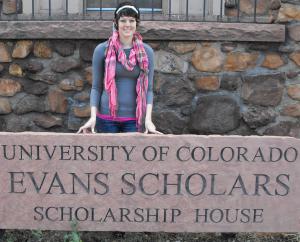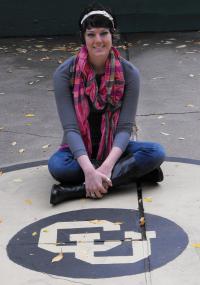College can be tough at times. There are concerns about grades, covering expenses, fitting in socially, adjusting to life away from home — you name it. But all those issues can take a back seat in the blink of an eye, as Leigh Levato discovered early in 2009.
One day, Levato was a typical University of Colorado sophomore in the Eisenhower-Evans Caddie Scholarship program. A day or two later — after returning from the national Evans Scholars Winter Outing in Chicago, where she had felt “terrible” — she was diagnosed with leukemia.
“I wasn’t really shocked, I was just numb,” Levato says now, recounting her reaction to being told she had a life-threatening cancer of the body’s blood-forming tissues. “I had been feeling terrible before that, so it was like, “˜Now I have an answer — but it’s not a good answer.’ It took me a while to come to terms with it.”
But after leaving CU — and the Evans Scholars house — for three semesters while fighting for her life, Levato recently returned to a sense of normalcy by re-enrolling at the university and moving back into the E.S. house. Suffice it to say it’s been a welcome reunion, both for her fellow Scholars and for Levato, whose leukemia is in remission, though she still regularly receives treatment.
“It’s hard to be sick and think of everyone up here going on with their education and their life,” Levato said during a half-hour interview at the house this week. “You want to be part of that. I really did miss being in the house. It’s such a special experience that I appreciate more, when before it was like, “˜It’s such a pain living with all these people sometimes.’ Now I have a different perspective and appreciate all the different personalities and how great everyone is.”
Levato, and most other current Eisenhower-Evans Scholars, will show their appreciation for the scholarship on Monday (Oct. 18) at Cherry Hills Country Club, where they’ll caddie at the 29th annual Par Club tournament, which raises money for the CU Evans Scholars.
What Levato has gone through “is an incredible story, an amazing story,” said Western Golf Association director — and former Eisenhower-Evans Scholar — Wyck Brown, who had Levato caddie for him more than a dozen times at Lakewood Country Club. “This has touched a lot of people. It was heartbreaking when I heard she had cancer. You kind of feel helpless to do anything, but it’s great that she’s back.”
 Given what she’s endured over the last 20 months, Levato enjoys house activities such as the Par Club tournament all the more these days. During the time she was away from the Evans Scholars house, she had 13 separate stays in the hospital, including one that lasted 14 days. She’s gone through countless “really intense” treatment sessions that sapped her energy, had bad side-effects, and left her immune system depleted to a bare minimum. She also lost her hair for about 15 months, though it’s been growing back since May.
Given what she’s endured over the last 20 months, Levato enjoys house activities such as the Par Club tournament all the more these days. During the time she was away from the Evans Scholars house, she had 13 separate stays in the hospital, including one that lasted 14 days. She’s gone through countless “really intense” treatment sessions that sapped her energy, had bad side-effects, and left her immune system depleted to a bare minimum. She also lost her hair for about 15 months, though it’s been growing back since May.
Levato’s treatments probably will continue into the middle of next year. They currently involve once-monthly chemotherapy and twice-monthly checkups. Her immune system is still compromised — she doesn’t have a roommate in the E.S. house because of that — but it’s not nearly as bad as it once was.
“It’s more manageable when you take all the precautions,” said Levato, now 21. “I’m getting treatment and still have to be careful, but I feel a ton better. I have the energy to do school and other things. It’s been really great.
“And everyone here (at the house) has just been amazing. They’re very understanding and considerate of what I have to be cautious about and trying to keep the house clean. I feel like everyone was thrilled to have me back. That’s been really nice.”
When Levato first learned she had leukemia, she quickly notified the WGA, which administers the Eisenhower-Evans Scholarship along with the CGA and CWGA.
“Of course they said, “˜Focus on your health and don’t worry about the scholarship,'” Levato recounted. “They basically said, once you feel up to it and you can be a full-time student again, you’ll have five semesters left (on scholarship). It’s been the least of my worries coming back here. That’s been awesome; the WGA has been so understanding.”
Before August of this year, Levato hadn’t taken any classes at CU since February of 2009. But she did make periodic visits to the E.S. house during here three semesters away.
“I’d try to come up whenever I could, but a lot of my closer friends in the house would come visit me all the time,” she said. “I didn’t want to just be gone. I came up for blood drives and other events when I could.”
But mainly, Levato focused on getting better. She lived with her family in Westminster — when she wasn’t in the hospital — and through her entire ordeal, she’s received an outpouring of support. It came from her fellow Evans Scholars, from members at Lakewood Country Club, from people at her old high school (Northglenn), and from folks at Legacy Ridge Golf Course, where Levato’s mother was a longtime employee.
“I don’t know how many cards I got; it was ridiculous to see the pile of cards I received during treatment,” Levato said. “I heard from pretty much everyone in the (E.S.) house throughout my treatment, especially my closer friends in the house. A lot of members I caddied for at Lakewood reached out both emotionally and monetary-wise, helping with the cost of treatment.
“It was definitely overwhelming the amount of support that I got not only through the scholarship but from the whole community — my high school, the golf community at Legacy Ridge. They had a fund-raising golf tournament there in September of 2009 and the turnout from that was just amazing. I think it raised $22,000.”
Despite contracting such a serious disease at a young age, Levato said she never asked, “Why me?”
“I’ve been treated at a pediatric clinic and I’m about the oldest patient they have there,” she noted. “You see all these patients (with cancer and other major diseases) — infants, 5 year olds, 10 year olds — and I’m like, “˜I’d rather take the illness than see any little kid have to go through it and not understand it.”
Not that she hasn’t on occasion felt the emotional effects of dealing with leukemia, but Levato has done her best not to let it keep her down for long periods of time.
“Just being thrown into that situation, you don’t have a choice, so you might as well have a positive attitude as much as you can,” she said. “My family has been the most amazing support system — my parents, my brother, my grandma. They’ve been there right by my side. There have definitely been times where it’s like it’s too much to take and you break down, but I think I’ve had a pretty good attitude about it the whole time.”
When Levato was contemplating her next course of action earlier this year, she admits to being a little apprehensive about the prospect of returning to school.
“That was something I was really worried about,” she said. “I felt like I’m such an airhead from this treatment, like I’m definitely not as sharp as I used to be. But I just decided I might as well go for it. There’s no sense in waiting around to feel better because who know if you’re going to feel better than this. That’s not a good attitude to have, but I decided to go for it. It’s turned out really well. I have been working pretty hard (at school). It’s been mostly enjoyable and I think I’m actually doing better now than I did before academically.
“A lot of college kids when they first come here look at it not as just, “˜I’m here to study and get a degree but I’m also here to socialize and have fun.’ While that’s really important and I still do that, I appreciate more the fact that I’m here and have this scholarship and someone else is pay for me to do this, so I might as well do the best I can at it and find something that I’m really interested in. Before, I didn’t really have that connection with school, which now I do.”
During her time away from CU, Levato decided to switch majors, going from architecture to communications. She’s not sure about what kind of job she’ll pursue with her degree, but she’s leaning toward something golf-related.
“I would love to do something in the golf course community, anything — event planning, tournament planning, something like that,” said Levato, who is taking a 12-hour class schedule this semester. “That would be an awesome job for me. I love being around the game and people who love the game, too.”
In addition to academics, Levato has been active in house-related activities this semester, including being a house parent and participating in the “Mac Games.” But she’s also involved her fellow Scholars in an event that’s now near and dear to her heart, for obvious reasons.
On Sept. 25, CU was one of the sites for the “Light the Night” walk and fund-raiser. Organized by the Leukemia & Lymphoma Society, the event pays tribute and brings hope to people battling blood cancers. Survivors and people representing those who have fallen victim to blood cancers carry gold or white balloons that are lighted up, while supporters have red balloons.
“It was my first time doing this event so I thought I’d involve the house, and anyone who wanted to come out and support did the walk,” Levato said. “There were probably 20 people from the house that came. It was a cool thing to do.”


